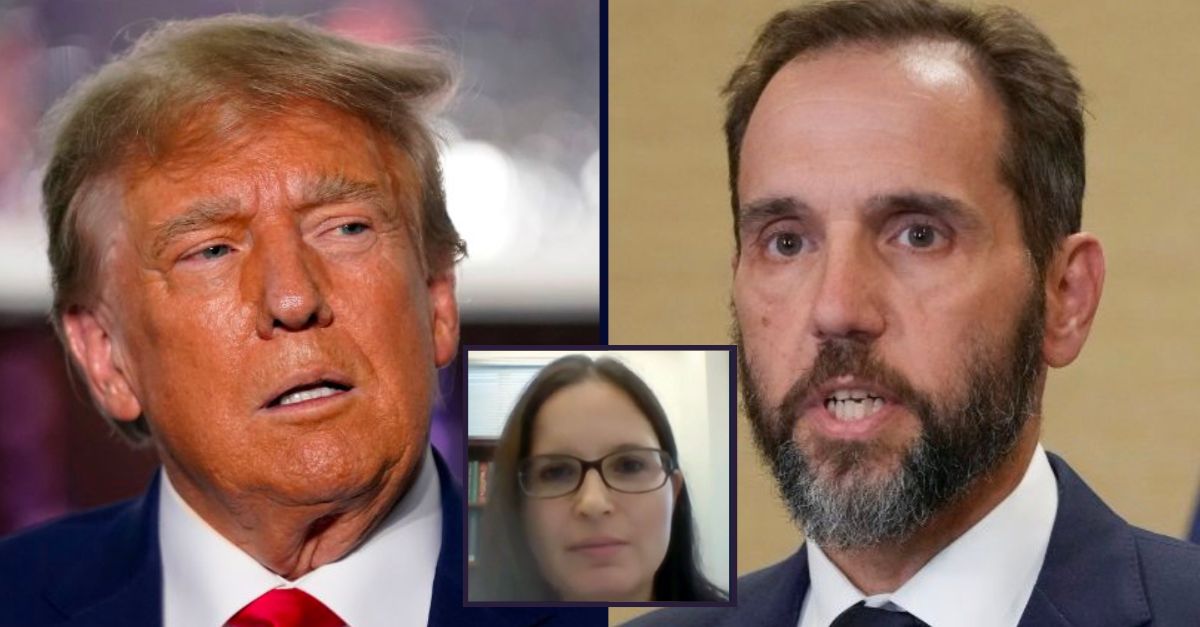
Left: FILE – Former President Donald Trump speaks at Trump National Golf Club in Bedminster, N.J., June 13, 2023, after pleading not guilty in a Miami courtroom earlier in the day to mishandling classified documents. (AP Photo/Andrew Harnik, File). Right: Special counsel Jack Smith speaks about an indictment of former President Donald Trump, Aug. 1, 2023, at a Department of Justice office in Washington. (AP Photo/Jacquelyn Martin). Inset: In this image from video provided by the U.S. Senate, Aileen M. Cannon speaks remotely during a Senate Judiciary Committee oversight nomination hearing to be U.S. District Court for the Southern District of Florida on July 29, 2020, in Washington.
Less than one day after Donald Trump was inaugurated for the second time, U.S. District Judge Aileen Cannon prohibited the U.S. Department of Justice from providing select members of Congress with the second volume of former special counsel Jack Smith’s report on his investigation the president’s alleged criminal conduct following his first term.
That final report comprises two volumes. The first, which was publicly released last week, relates to his investigation and prosecution of Trump in connection with his alleged efforts to subvert the 2020 presidential election. The second, which deals with Trump allegedly mishandling classified documents at his Mar-a-Lago home, has been enjoined by Cannon from being released to the Chairmen and Ranking Members of the House and Senate Judiciary Committees.
As Law&Crime has previously reported, the federal criminal cases against Trump have been dropped due to longstanding DOJ policy against indicting and prosecuting a sitting president, even as Smith moved forward with preparing a report about the investigations themselves. But presidential immunity from prosecution does not extend to Trump’s co-defendants in the Mar-a-Lago classified documents case, Walt Nauta and Carlos De Oliveira.
Nauta and De Oliveira have repeatedly implored Cannon to stop the release of the report in any capacity, arguing it would cause them irreparable damage — even if the cases against them are dropped, as is likely.
Cannon on Tuesday morning issued a 14-page order reasoning that the DOJ under the previous administration offered “no valid justification” for its stated desire to share a redacted version of the report’s second volume with four lawmakers while the cases against the president’s former co-defendants remains on appeal.
In the order, Cannon maligned the Biden administration’s DOJ for its efforts to have the report viewed by congressional leaders, taking particular issue with the claim that Attorney General Merrick Garland had “limited time” remaining in his position and wanted to “see this [investigation] through to conclusion and comply with historical practice.”
“Never before has the Department of Justice, prior to the conclusion of criminal proceedings against a defendant — and absent a litigation-specific reason as appropriate in the case itself — sought to disclose outside the Department a report prepared by a Special Counsel containing substantive and voluminous case information. Until now,” Cannon wrote. “There is no ‘historical practice’ of providing Special Counsel reports to Congress, even on a limited basis, pending conclusion of criminal proceedings. In fact, there is not one instance of this happening until now.”
The judge went on to accuse the DOJ’s counsel of misleading the court regarding the actions of previous special counsels in similar situations and emphasized that there was no indication of “pending legislative activity that could be aided by the proposed disclosure” of the report.
“These statements do not reflect well on the Department,” Cannon wrote about the DOJ’s proposed reasons to push for the report’s release. “In short, the Department offers no valid justification for the purportedly urgent desire to release to members of Congress case information in an ongoing criminal proceeding.”
Cannon also rejected the DOJ’s claim that limited private review of the report by the aforementioned lawmakers would safeguard against its contents being leaked, stating that the due process rights of Nauta and De Oliveira “would be imperiled by public dissemination of Volume II.”
“This Court lacks any means to enforce any proffered conditions of confidentiality, to the extent they even exist in memorialized form. And most fundamentally, the Department has offered no valid reason to engage in this gamble with the Defendants’ rights,” Cannon wrote. “The bare wishes of one Attorney General with ‘limited time’ in office to comply with a non-existent ‘historical practice’ of releasing Special Counsel reports in the pendency of criminal proceedings is not a valid reason. And surely it does not override the obvious constitutional interests of Defendants in this action and this Court’s duty to protect the integrity of this proceeding.”
Cannon last year controversially dismissed the classified documents case, reasoning that Smith’s appointment as special counsel was unlawful. The Justice Department appealed the ruling (which was likely to be overturned), but with Trump retaking office on Monday, the DOJ is expected to drop any efforts to revive the cases against Nauta and De Oliveira.
Cannon’s order prohibiting the DOJ from sharing any portion of the second volume of Smith’s report remains in effect for 30 days after “full conclusion” of the case on the appellate level.






